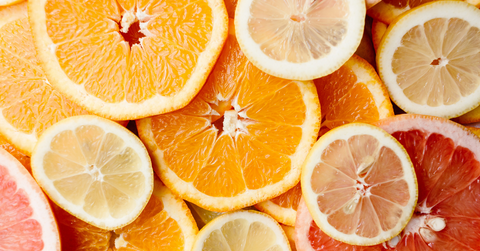Certain foods can contribute to inflammation and exacerbate the symptoms of eczema, which is why diet is a critical factor to consider when treating eczema naturally.
A 2017 review published in The Lancet reported that up to 81% of people with eczema also had some form of food allergy and suggested that food allergies are strongly associated with more severe and persistent symptoms of eczema.
This blog discusses foods that may cause allergic reactions and worsen symptoms in eczema sufferers.
6 Foods to Avoid With Eczema
In a 2017 study published in the Journal of Dermatological Treatment, up to 136 out of 169 patients with atopic dermatitis reported that they modified and eliminated certain foods from their diet to manage their skin condition. Junk food, dairy, and gluten were confirmed to be the most commonly eliminated foods.
Also, some of the eczema sufferers reported that they felt the best improvements in their skin from:
- removing white flour
- going gluten-free
- eliminating nightshades (e.g., tomatoes, eggplants, white potatoes, peppers, etc.)
Close to 80% of the study participants reported adding certain foods to their diet, with more than half of them eating more vegetables, fruits, and fish oil. The best improvements in the skin were noted when adding:
- vegetables
- organic foods
- fish oil
Let’s discuss some popular and not-so-known foods that may trigger or worsen eczema.

Foods High in Nickel
Nickel allergy is said to be one of the most common causes of allergic contact dermatitis. For people with dyshidrotic eczema (otherwise known as pompholyx) — a type of eczema that appears as itchy blisters on the hands and feet — consuming foods high in nickel can exacerbate their symptoms, causing intense burning, itching, and deep cracks.
In one clinical trial, nine out of twelve female patients with dyshidrotic eczema on their hands suffered aggravated eczema symptoms after ingesting nickel. Seven patients in the group also reported outbreaks of eczema that had already started to heal.
In fact, experts believe sensitivity to metals like nickel to be a probable cause of dyshidrotic eczema.
Foods that are usually high in nickel include:
- Soya bean
- Cocoa and chocolate
- Shellfish
- Legumes
- Whole wheat and multigrain flours
- Grains (e.g., rye, oatmeal, buckwheat, unpolished brown rice, millet, etc.)
- Nuts (e.g., walnuts, pistachios, peanuts, hazelnuts, almonds, etc.)
- Seeds (e.g., linseeds, sunflower seeds, poppy seeds, alfalfa seeds, etc.)
- Canned foods (e.g., meat, fish, soups, vegetables, coconut milk, etc.)
Eggs
Eggs are a trigger food for eczema flare-ups in infants and young children. One study revealed that infants with eczema are six times likely to have an egg allergy, which is set to trigger an aggravated eczematic response.
You should only have to eliminate eggs — and foods like custard, pudding, ice cream, baked goods, etc., that contain eggs — from your child’s diet for a short period as they are expected to outgrow their allergy. However, another study suggests that egg allergies may continue as a “triggering-exacerbating factor” in adolescents and adults with atopic eczema.
If you love eggs and notice that they cause your eczema to flare up, consider replacing them with flax eggs (a mixture of ground flax seeds and water in 1:3) in your cooking and baking or plant-based egg brands like Just Egg for making scrambled eggs.

Dairy
An interesting study on Diet and Dermatitis cites dairy, including cow’s milk, cheese, yogurt, butter, ice cream, milk chocolate, etc., as foods that can cause immediate eczema flare-ups or late eczematous reactions.
If you are eliminating dairy from your diet, consider plants like kale, broccoli, collard greens, beet greens, bok choy, and calcium-fortified plant milk for your calcium fix. Vegan cheese and nutritional yeast make a good replacement for cheese. And you can use cashew cream as a substitute for heavy cream in your baking, smoothie, or homemade ice cream recipe.

Nightshades
Nightshades are a family of plants, including tomatoes, peppers, potatoes, aubergines, etc., known to contain lectin and small amounts of an alkaloid called solanine. Solanine serves as a natural pesticide in plants, but in some sensitive people, it may elicit inflammatory responses and result in allergies.
There aren’t any studies that prove the benefits of eliminating nightshades for relieving eczema. But, our research led us to discover MasterChef judge John Torode, who spoke way back in 2009 about how eliminating the deadly nightshade helped relieve his extremely severe eczema.
Again, we looked through the Reddit community eczema and found many interesting stories about nightshades being a hidden food trigger for eczema and how eczema sufferers got healed by eliminating nightshades from their diet.
“...I decided to cut nightshades out of my diet. Almost overnight, my hands stopped itching. Within a week, the blisters disappeared, the swelling subsided, and the cracking started to heal,” says Buffalippo, a Redditor who suffered dyshidrotic eczema for a painfully long time.
Cutting out nightshades may be difficult because they are staple foods. Watch out for nightshades hidden in plain sight (i.e., ketchup, curry sauce, pasta sauce, BBQ sauce, potato fries, and red spices). You would also need to quit smoking as tobacco is equally a nightshade.

Citrus Fruits
Eating citrus fruits such as oranges, lemons, limes, tangerines, grapefruits, or drinking citrus fruit juices may trigger an eczema flare-up. Citrus fruits are concentrated with natural chemicals salicylate and amines, which were proven to have a triggering effect on eczema sufferers.
Citrus fruit peels contain essential oils similar to that of Balsam of Peru, a sweet-smelling plant resin that has been said to be a trigger for eczema. So, handling citrus peels may cause allergic contact dermatitis characterized by itching, redness, swelling, and blisters in persons allergic to Balsam of Peru.

Nuts
Nut allergies are arguably the most common and serious type of allergy. Unsurprisingly, it is quite common for eczema sufferers, especially infants with eczema, to be sensitive to nuts.
If you notice your eczema symptoms worsen when you eat peanuts, hazelnuts, Brazil nuts, almonds, or cashew, it will be best to eliminate them from your diet and see your doctor for allergy testing.

Photo by Towfiqu barbhuiya on Unsplash
Other trigger foods for eczema include:
- Wheat and gluten
- Soy products
- MSG
- Fish
- For people with hypersensitivity to birch pollen, foods like apple, cherry, peach, plum, carrots, peanuts, almonds, celery, etc., can potentially worsen their atopic dermatitis.
Conclusion
Not all the foods discussed in this blog will worsen your eczema. To learn those trigger foods you must avoid, you would have to pay more attention to how your body responds to different foods. Keeping a food journal will help you keep track of the foods that worsen or help your eczema.
We recommend working a lot of probiotic-rich vegetables and organic foods into your diet. Probiotics help increase friendly gut bacteria, which, in turn, boosts immune function and prevents allergic inflammation.
The Eczema Relief Store provides simple, safe, and effective products such as topical moisturizer and steroids, soft cotton gloves, itchy spray, treatment socks, and other eczema relief products for soothing eczema in babies, kids, and adults.

